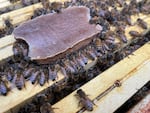Honey bees are vital to agriculture in the Pacific Northwest. But it’s increasingly difficult to keep colonies alive from year to year, causing concern about the future of our food systems.
But now an international team, including researchers at Washington State University, has developed a new supplemental food source that could keep hives strong when deployed on agricultural land.
Honey bees are major pollinators of more than 75% of global crops. But bees have been struggling — with habitat loss, climate change, pesticide exposure, parasites, poor nutrition and diseases all contributing. Based on a recent spike in hive collapses, scientists estimate up to 70% of commercial colonies will die this year.
On the nutrition front, bees rely on collecting nectar and pollen from a variety of sources. In fact, they need that variety to meet their nutritional needs. But when honey bees are used in agriculture, they’re often deployed to pollinate large swaths of one single crop, which often just doesn’t offer enough nutritional variety.
WSU researchers have been working with a Belgian company to find a way to provide these agricultural bees with a supplement that will provide all of a hive’s nutritional needs. The new artificial bee food is kind of like those full-nutrition protein bars you’d bring along on a hike.

Honey bees chew on a new food product that meets all of their nutritional needs. The product was developed in part by scientists at Washington State University.
Courtesy APIX Biosciences
The researchers used the pollen-replacing food in hives set out near the Eastern Washington towns of Othello and Mount Vernon. They targeted blueberry and sunflower fields, which are known to be poor nutritional sources for honey bees.
In tests, the hives given the new food thrived, growing to have more than twice the number of bees (a measure of hive health and predictor of survival) as those without.
The scientists were also able to isolate a chemical compound present in pollen that appears to be especially important for maintaining honey bee health.
If the new food is able to improve hive resilience, the researchers say it could contribute to higher crop yields and a better food security.
The research is published in the Proceedings of the Royal Society B.
In these All Science Snapshots, “All Science. No Fiction.” creator Jes Burns features the most interesting, wondrous and hopeful science coming out of the Pacific Northwest.
Find full episodes of “All Science. No Fiction.” here.
And remember: Science builds on the science that came before. No one study tells the whole story.
